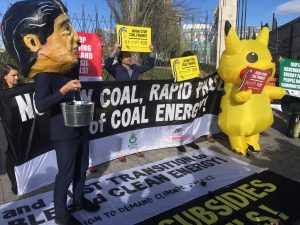There are two main components that go into energy policy calculus. First, there is the internal calculation, with domestic actors looking at various factors within their local energy markets and deciding what type of energy mix is optimal. As I’ve written previously, when Vietnam and Thailand became net importers of fossil fuels is also when their political classes got serious about renewable energy. Indonesia and Malaysia, under no similar internal constraint, have been considerably less motivated.
The second component is the availability of external financing. Fast growing economies like Vietnam, Indonesia, and the Philippines have seen surging electricity demand in recent years. This breakneck growth requires billions of dollars of investment in order to build out new capacity, which is beyond what many countries can fund on their own. Development finance institutions in Japan, South Korea, China, and Europe, as well as multilateral institutions like the Asian Development Bank, thus play an important role in bankrolling big power projects.
If a major overseas lender like the Japan Bank of International Cooperation is no longer willing to underwrite multi-billion dollar coal power plants, then it will severely constrain the ability of emerging markets to build them. This is why recent commitments by major lenders in Japan and South Korea to curtail financing for coal power in Southeast Asia are a big deal. But an important question remains: how serious are they?
Climate optimists often point to the rapid drop in costs for renewable energies like solar and wind as proof that an unstoppable clean energy transition is underway. Over time, the economic inertia of cheaper renewables will cause energy markets to shift their equilibriums away from fossil fuels and toward more efficient and lower-cost renewable energy sources. But in countries where powerful vested interests benefit from maintaining a role for coal in global energy markets, this transition to cleaner energy is not likely to eventuate without some difficult growing pains and political compromises.
Both Japan and South Korea have major energy and financial companies that are part of a global network built around financing, constructing and operating coal power plants. Financial institutions in both countries loan emerging markets billions of dollars to build coal power plants that use Japanese or Korean manufactured parts. Japanese and Korean energy companies often partner with the loan recipients and take equity stakes in the power plants, so these projects also create long-term revenue streams. With fast-growing neighbors in Southeast Asia stimulating demand for energy, it’s a natural market for Japan and South Korea to export their surplus financial capital and manufactured goods.
The scale of Japanese and South Korean investment in Southeast Asia’s coal power industry is enormous. During Indonesian President Joko Widodo’s first term in office, his government inked four mega-deals with the Japan Bank of International Cooperation to develop 6,760 MW of coal power plants valued at $12.3 billion. A Japanese-Korean partnership is also currently developing a pair of large coal-fired power plants in Vietnam valued at $5.37 billion. So while announcing that they will start phasing out financing of coal power sounds great, you have to wonder why these giant corporations and financial institutions are now willing to go against their own self-interest and back away from such lucrative deals.
According to a report in Global Trade Review, Japan will only partially restrict state financing for future projects and will “continue supporting coal projects if they use highly efficient technologies.” The term “highly efficient technologies” is doing a lot of work here, as it leaves open a potentially expansive definition of efficiency.
Ultra-supercritical coal power plants still burn coal and dump carbon into the atmosphere; they just do it more efficiently than older designs. If these power plants are defined as efficient simply because they burn coal more efficiently, it will not reduce carbon emissions by much. It will thus be very important over the coming years to see exactly how these terms are defined and implemented in practice.
These announcements are encouraging and send an important signal. But given the geoeconomic stakes and the money involved in this industry, if loopholes can be found in these commitments I expect they will be liberally exploited. It is important to keep in mind that just because wind and solar power are getting cheaper, it is not a fait accompli that they will displace coal. The details matter.
It will still require dedicated policy advocacy and human agency to compel vested corporate and financial giants to make hard choices on coal that work against their self-interest. Right now they are saying the right things, but revisiting the composition of JBIC and other big lenders’ loan portfolios a few years from now will tell us whether this was really a game changer or just a PR move.
































